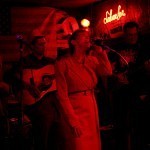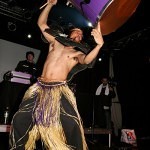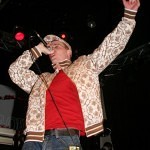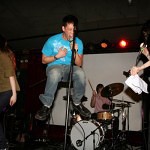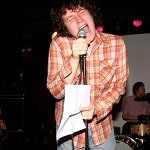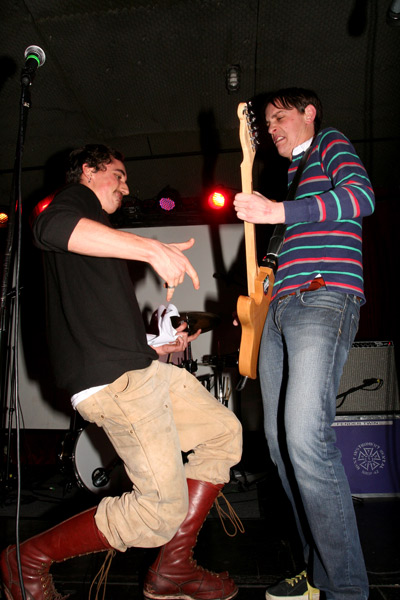 Originally published in Verbicide issue #23
Originally published in Verbicide issue #23
The first time I go to Hip Hop Karaoke, it’s a crushing mass of hip-hop fans at Rothko on New York’s Lower East Side, and I can’t even push my way to the bar for a beer. On stage I recognize Josh Dick, aka Josh Diggedy, the hypeman; I haven’t seen him since college, when he was calling himself Lyrical Jester and rapping in front of a band at house parties, back when we were all sure he was going to be the next big thing. Now he’s in front of a bigger crowd than I’ve ever seen him play, doing old school tunes, grinning, a towel around his neck to catch the sweat.
Related Posts
There’s a guy and a girl on stage performing Mary J. Blige and Method Man’s “You’re All I Need,” and the crowd is loving it. She nails that soaring line, “You are my destiny,” and they blast it out, too. She’s dancing, smiling, her eyes shut tight while she sings; it looks like total bliss, and the audience is rocking, as into it as she is. I’m blown away. I want to be up there.
After I leave and the spell is broken, I realize I don’t know what makes it work. Why are people packing a club every month for amateur hour, for performances of songs that were hits when we were teenagers? And in New York, of all places, where there is professional entertainment pouring out of almost every bar, club, and abandoned warehouse?
And it’s not just that one monthly hip-hop event. Live band karaoke is happening all over the city, in all different genres: metal and punk at Arlene’s Grocery in SoHo, rock n’ roll at Lucky Cheng’s drag club in the Village, rock and country at Hank’s Saloon in Brooklyn.
In fact, it’s been around for quite a while — Los Angeles’s Punk Rock Karaoke started in 1996 — but it’s been growing faster in the past couple of years. Karaoke bands have been playing packed houses in Chicago, Los Angeles, Boston, Portland, OR, Charleston, NC, and more.
Why the spike? Maybe it’s that the kids of the ’80s are finally all grown up. And many of us have birthday party memories of gripping a microphone attached to a tape player and a speaker, singing our little hearts out. We believed then that, yes, absolutely, we could grow up and do anything we wanted, including becoming the guys in Guns ’N Roses, or the girls in Salt-N-Pepa. We could grow up to be rock stars.
Now, in our 20s and 30s, we are not, in fact, rock stars. We are in finance and law and construction and restaurant management and retail. Those dreams are permanently deferred.
Except we’ve found this other way to live them out.
The first time I see Dashaun Simmons perform, it’s in a fuzzy Web video shot at a Hip Hop Karaoke event. Even on this video I can still tell he rocked: fist pumping, dreads swinging, blasting “The Choice Is Yours” by Black Sheep. I hear the crowd screaming.
Dashaun is one of 12 people picked by the three founders of Hip Hop Karaoke — longtime friends Josh (Diggedy), Jason Newman, and Zach Quillen (aka DJ Wex) who all have fulltime jobs outside HHK — to compete in the first Hip Hop Karaoke Championship, at the High Line Ballroom, capacity 700. Just from watching Dashaun’s promo video (each contestant has one) I already want him to win.
I call him up before the show; he’s 28, in advertising, genuine, and well spoken. I tell him I’m writing a story to find out why people are suddenly flocking to live karaoke. I ask him if when he was a kid he really believed he would become a performer.
“Oh, definitely — it was a reality for me,” he says. “I was part of a big group of other teenagers who were serious about rhyming, and also had connections with people who were already out and in the game, and were kind of feeding us energy: ‘You guys could do it, too, you can be the next ones out there.’ I was doing shows, I was recording songs.”
But he watched his friends’ lyrical skills surpass his, and eventually he decided to intern at a label instead. When he stumbled upon Hip Hop Karaoke, he found something even better than the career he’d been laboring over: here he can perform the songs he loves most, and get the kind of crowd reaction he’s been chasing all along — because the crowd loves those songs, too.
“So now, instead of just writing Dashaun’s ‘okay’ rhymes, I can do Rakim’s great lines,” Dashaun says in his video promo, and it makes perfect sense. It’s no longer a dream deferred.
The monthly show, now at the Knitting Factory, is all about the music — songs by masters from a certain era, like Rakim, Wu Tang, and Nas. Jay, one of the organizers, says some fans have told him they come to these free shows to see good hip-hop performances. Plus, by some agreed upon, unwritten law, there’s no booing. And if a singer forgets a line, the crowd sings it.
Before the show I ask Dashaun who he thinks he needs to beat, and he gets shy, telling me instead he’s heard amazing performances from all his competitors. This happens over and over as I talk to other contestants, and I get it: for this crowd, it really is about loving the music.
For other crowds, the reasons they do live karaoke are a little more varied. At Rock Star Karaoke, people pick tunes from “American Girl” to “Mr. Bright Side,” but lean heavily on songs of the ‘80s.
And yes, some of them are drunken fools, and some just mumble shyly into the lyrics sheet, but most really play to the band, knowing this is a show — and they’re the star. I saw a Midwestern-looking man almost blow the PA system doing “White Wedding,” and a beautiful male chanteuse improvise a 10-minute intro to a Nina Simone song while the band played behind him. That guy even made his own costume.
I decide to hit up a show at Studio B in Brooklyn in January to see Portland-based rock band The Thermals, on Sub Pop Records, scheduled to follow their set with a dozen or more karaoke tunes, plus a few of their own songs.
I stake out a spot near the stage so I can talk to people on their way off, fresh from the high of performing. From here I am mesmerized by The Thermals during their first set: the tight performance, the absurdly high energy that stays with them from the first song to the last, with almost no breaks in between. I can’t take my eyes off bassist Kathy Foster, who holds a beatific Mona Lisa smile while bringing down the house. (At one point she asks the crowd, sly and sweet at the same time, “How many of you guys karaoke? I’ve never karaoked.”) Watching her I catch myself smiling back and thinking, Damn, I wish I were in her band! And that, of course, is why fans want to get on stage with The Thermals.
The first guy on stage does a loopy and off-key rendition of The Kinks’ “What I Like About You,” and The Thermals are in their groove, playing the hell out of it and helping him with timing and lyrics. A few numbers later comes shy-looking Emi Talley. I figure her for a lackluster performance — and then she nails Queen’s “Another One Bites the Dust” without even looking at the lyrics sheet.
“My whole family, we have a karaoke machine at home,” she says to me after, still giddy from her first onstage experience. “I sing, like, Mariah Carey…I know this is kind of cliché, but Mariah, and I don’t know, Sade.”
What the hell? Tonight, she picked Queen instead. And she rocked.
I head to a Kuntry Karaoke show at Hank’s Saloon soon after, missing what was apparently a phenomenal karaoke band by one week. The regular emcee, Rob Ryan, has just moved to Germany, and the guitarist, Boo Reiner of Demolition String Band (Reiner won a Grammy with The Klezmatics), is away. The band is all subs now except for the drummer. It’s the night after the Super Bowl, and it’s raining. This makes for a light crowd.
But when the band starts up — “We’re gonna do a little old Hank Williams song called ‘Mind Your Own Business,’” says Izzy Zaidman, tonight’s front man — a woman in a pink dress and a man in denim begin a gliding two-step near the red-lit stage, and a few hipsters start nodding their heads and looking over the clipboard for familiar tunes. The band is tight and professional, and tonight, maybe by a fluke, almost everyone who gets up to sing is either in a band or has been at some point.
Mafa Edwards, the woman in the pink dress, does the first karaoke. She sings a lovely “Peaceful, Easy Feeling” by The Eagles, and comes back later for a lilting “I Fall To Pieces” by Patsy Cline. She and the band follow each other like good dancers.
Someone does Travis Tritt’s “Here’s A Quarter (Call Someone Who Cares)” and another musician in the crowd gets up to do Dave Dudley’s “Six Days On The Road.” Almost everyone in the bar is dancing, and by the time I get ready to leave at midnight, one guy has been up three times.
“At the beginning of the night, it’s ‘Oh, I’m not singing,’ and at the end of the night, you can’t get the microphone out of their hands,” says John Brien, a former Dubliner who owns Hank’s and a few other bars in New York.
Since he bought Hank’s two years ago, he’s focused on bringing in live music seven nights a week, giving as many underdog bands as he can a chance to play. He’s upping karaoke to two nights a week, adding a rock band on Wednesdays. No bar just has “pure drinking” anymore, he says. “You gotta have something to bring ‘em in the door.”
Live karaoke seems to work.
“I’ve always wanted to sing in a band,” he adds, good-naturedly. “I tried the guitar, but there’s too many damn guitar players anyway.”
Dashaun doesn’t win the Hip Hop Karaoke Championship. He’s really good, but he doesn’t seem to electrify the crowd, whether because he goes on so early in the show, or because he’s a little nervous, or some other reason entirely. Chef Lowe, the champ, cuts through rounds one and two with skilled and energized performances of Big Daddy Kane’s “Warm It Up Kane” and Tribe Called Quest’s “Check The Rime,” then clinches round three with “Hip Hop” by Dead Prez.
The first time Chef went to HHK, in 2006, he dashed straight over from a family reunion, wanting to see if it could be as cool as he hoped. He hasn’t missed one since.
“When I got there, I was moved. It was crazy,” he says. “The energy level was high, the crowd was crazy — it was so dope.”
At one point, Chef was in three different music groups, working toward a career as a performer. But life got complicated: band members got married, had kids — Chef has a son, too — so instead he started the Chef Lowe Group, which promotes other bands.
Now he gets his performing fix once a month at Hip Hop Karaoke.
“It’s kind of community-based, because you meet a bunch of people who like all your favorite songs, and they know the words, too,” he says. “Most relationships, long term, they maybe have a song that’s their song. But these people here, they have at least 10 songs that are ours. It’s a wonderful thing, man. I love it.”
In the dressing room after the championship, Zach starts to thank everyone for performing.
“We had such a good time,” he says. “Tonight was so big for Hip Hop Karaoke, it really was. We sold out the High Line Ballroom—” and here, one of the contestants interrupts with, “Why is there no February show?”
A bunch of them laugh and clap — because it’s about the music, and they can’t wait to get back to it.
